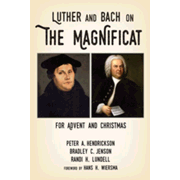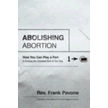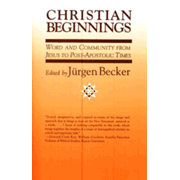ON THE Fourth Sunday of Advent we
hear the Gospel According to Saint Luke. As drawn likely from both oral and
written sources, by using them our writer sheds singular light on the conversation that
occurred when our Lord’s mother, Mary... traveled to visit with Elizabeth. This
scripture segment revealed the future relationship that unfolded between Jesus
and his cousin, John the Baptist…
In
those days Mary arose and went with haste into the hill country, to a city of
Judah, and she entered the house of Zechariah and greeted Elizabeth. And when
Elizabeth heard the greeting of Mary, the babe leaped in her womb; and
Elizabeth was filled with the Holy Spirit and she exclaimed
with a loud cry, “Blessed are you among women, and blessed is the fruit of your
womb!
And why is this granted me, that the mother of
my Lord should come to me?
For behold, when the voice of your greeting
came to my ears, the babe in my womb leaped for joy. And blessed is she who
believed that there would be a fulfillment of what was spoken to her from the
Lord.”
And
Mary said,
“My soul magnifies the Lord,
and my spirit rejoices in God my Savior,
for he has regarded the low estate of his
handmaiden.
For behold, henceforth all generations
will call me blessed;
for he who is mighty has done great things
for me,
and holy is his name.
And his mercy is on those who fear him
from generation to generation.
He has shown strength with his arm,
he has scattered the proud in the
imagination of their hearts,
he has put down the mighty from their
thrones,
and exalted those of low degree;
he has filled the hungry with good things,
and the rich he has sent empty away.
He has helped his servant Israel,
in remembrance of his mercy,
as he spoke to our fathers,
to Abraham and to his posterity forever.”
And
Mary remained with her about three months, and returned to her home.
(Luke
1:39-56)
 |
Luther and Bach on the Magnificat: For Advent and Christmas - eBook By Peter A. Hendrickson & Bradley C. Jenson |
Announced
to Pronounced
Our author immediately settled his
readers in progression from the Annunciation, wherein Mary had learned from the
angel that she was to be with child, to focusing us upon the eternally planned
birth of our Lord. By doing so, this writing placed the birth of Jesus firmly
within the religious realm of the writer's own day. Through the text, likely crafted by
the early Church during a decade some fifty years after the actual
occurrence, we see that the birth of Jesus was firmly anchored prophetically by Jewish
prophecy. The reading also reinforced our Lord’s leadership and his relationship
to John the Baptist, one which had been contested somewhat during the first
century.
 |
Abolishing Abortion: How You Can Play a Part in Ending the Greatest Evil of Our Day - eBook By Rev. Frank Pavone |
Nazareth
to Bethlehem
Formed by the Holy Spirit, the
witness of Luke tells of Mary’s leaving her family’s town of residence, to
reside for a time with a relative named Elizabeth, the wife of the priest Zechariah. The familial relationship between the two women is not clearly made
by scripture. Though it is possible that Mary was Elizabeth’s cousin, given age differences, it is my opinion that Elizabeth also may have been Mary’s
aunt. In either case, our Lord’s mother was sent there to reside as her
pregnancy went beyond the first trimester. The physical showing of the child would
be detectable by the townspeople of Nazareth. Cloistered at her relative’s
home, she could eventually return to Nazareth in marriage to Joseph. In
revelation then, I believe that the sequence of events and their timing remains
secondary to the purposes of Luke’s witness. The story was likely passed along by Luke and
used to historically solidify the belief that the birth of our Lord was
predetermined by God, and his position in hierarchy had been eternally
guaranteed.
As evidenced here concerning the prophetic,
it is submitted that the words of the poetic section called the Magnificat, closely
mirrors those found for centuries in the Jewish scriptures. The song was
recorded as the birth poem of Hannah, the mother of the prophet
Samuel.
Hannah
also prayed and said,
“My heart exults in the Lord;
my strength is exalted in the Lord.
My mouth derides my enemies,
because I rejoice in thy salvation.
“There is none holy like the Lord,
there is none besides thee;
there is no rock like our God.
Talk no more so very proudly,
let not arrogance come from your mouth;
for the Lord
is a God of knowledge,
and by him actions are weighed.
The bows of the mighty are broken,
but the feeble gird on strength.
Those who were full have hired themselves
out for bread,
but those who were hungry have ceased to
hunger.
The barren has borne seven,
but she who has many children is forlorn.
The Lord
kills and brings to life;
he brings down to Sheol and raises up.
The Lord
makes poor and makes rich;
he brings low, he also exalts.
He raises up the poor from the dust;
he lifts the needy from the ash heap,
to make them sit with princes
and inherit a seat of honor.
For the pillars of the earth are the Lord’s,
and on them he has set the world.
“He will guard the feet of his faithful
ones;
but the wicked shall be cut off in
darkness;
for not by might shall a man prevail.
The adversaries of the Lord shall be broken to pieces;
against them he will thunder in heaven.
The Lord
will judge the ends of the earth;
he will give strength to his king,
and exalt the power of his anointed.”
(1
Samuel 2:1-10)
Using solid progression from the
Hebrew scriptures then, Luke presented a divine announcement in the doings of
humanity. First we read that an angel had told Zechariah that his elderly wife
Elizabeth was to be with child. This pronouncement rings similarly to an
angel’s message to Abraham’s wife Sarah. Thus a first reference to traditional Judaism
appeared. Next then, the angel or messenger of the Lord told Mary that she was
to give birth in spite of the fact that she had not been sexually active with a man. Though
barely fourteen years in age, the words she pronounced in response were also
rooted in scripture. Finally, this poetic Magnificat section provided a third scriptural
leg in a solid seat for the witness concerning the person of Jesus, who is the
Christ of God.
Finally... we notice that a note of prophetic
recognition was subtly presented by Luke. This occurred as Elizabeth felt
her baby leap in her womb. This action by yet-to-be born John, often termed as
the “quickening”, related that when Mary made the announcement... the prophetic
Spirit was already present in the life of the unborn child.
The powerful presence of that same Spirit encased in scripture caused
the poetic outburst of Mary, and recalled for the later community of Luke, the wonderful testimony
of Elizabeth. These consequently became evidence for persons in his communities
that Jesus was indeed born as the Christ, the Messiah of God. Jesus is the Anointed
One. John then, by his recognition in the womb, historically gives evidence of our
Lord’s priority. As well, the instance gives to us scriptural evidence once again that God
shall give faith as a gift to whomever he shall choose… whenever he chooses… even
to those who are not yet born.
From
Faith unto Faith…
As we consider this wondrous scene presented
to the early churches, we need remember that these communities were those that
were under siege since the days of the Resurrection until the writing of Luke’s
gospel in approximately 85 A.D. and beyond. Thus we know that the time for oral development
of this story spanned an era from the ruling of Roman’s Caesar Augustus through
to the rule of the later Vespasian. Within that time frame, the story was
clearly presented by many witnesses about the gift of faith given to the
Church at the Feast of Pentecost. Thus we can clearly
comprehend that we today inherit faith just as the infant to be named John was empowered.
John, prompted by the Spirit while yet an infant, leaped for joy at the Good News provided by Mary. In joy also then we now have knowledge that we receive the
same gift in the same way. Note that through the waters of Holy Baptism
like the waters of Elizabeth’s womb, the Spirit is freely given to us as a gift.
Therefore, we who read this story from those hallowed pages are persons who now nest
comfortably in the womb of the Church during the season of Advent. We become roused
to recognition, and the remembrance of eternal life is made possible by the
presence of our Lord sent into the world.
Blessed ones, consider this! Any who are baptized
similarly to the temporal washing that was done by John in the Jordan River are now baptized and cleansed by the Holy Spirit, and receive forgiveness through Christ Jesus by water and that same Holy Spirit. We are
given to eternally recall that Jesus is the Christ of God. Jesus was and yet is
the Sent One appointed. His task was set before him by the Father from the foundation
of all creation. Jesus was born, baptized by John and raised up as an adult... died for us, to set us
free from the power of sin, death and evil. Thus it is, we of the Church prepare for our own
Christmas celebrations. I ask that we be like Mary… to ponder and pray in these last
days… think deeply concerning these things.
For as it was written by Saint
Paul…
First
of all, then, I urge that supplications, prayers, intercessions, and
thanksgivings be made for all men, for kings and all who are in high positions,
that we may lead a quiet and peaceable life, godly and respectful in every way.
This is good, and it is acceptable in the sight of God our Savior, who desires
all men to be saved and to come to the knowledge of the truth. For there is one
God, and there is one mediator between God and men, the man Christ Jesus, who
gave himself as a ransom for all, the testimony to which was borne at the
proper time.
(1 Timothy 2:1-6)
In keeping with this prayerful
request for a peaceful season, please know that you are invited to attend a traditional Christian church that rightly confesses Jesus Christ as Lord. May the Peace of God, which surpasses all human understanding, keep your hearts and minds in Christ Jesus, our Lord.



No comments:
Post a Comment